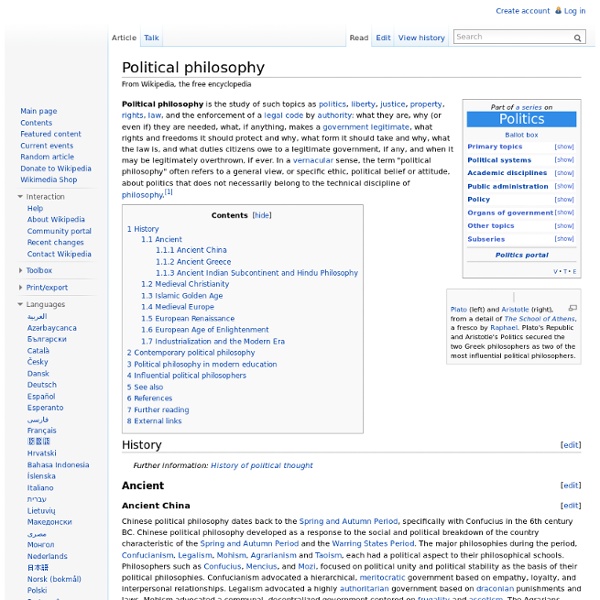Jean-Jacques Rousseau
Jean-Jacques Rousseau (/ruːˈsoʊ/;[1] French: [ʒɑ̃ʒak ʁuso]; 28 June 1712 – 2 July 1778) was a Genevan philosopher, writer, and composer of the 18th century. His political philosophy influenced the French Revolution as well as the overall development of modern political, sociological, and educational thought. Biography[edit] Youth[edit]
Philosophy
Philosophy is the study of general and fundamental problems, such as those connected with reality, existence, knowledge, values, reason, mind, and language.[1][2] Philosophy is distinguished from other ways of addressing such problems by its critical, generally systematic approach and its reliance on rational argument.[3] In more casual speech, by extension, "philosophy" can refer to "the most basic beliefs, concepts, and attitudes of an individual or group".[4] The word "philosophy" comes from the Ancient Greek φιλοσοφία (philosophia), which literally means "love of wisdom".[5][6][7] The introduction of the terms "philosopher" and "philosophy" has been ascribed to the Greek thinker Pythagoras.[8] Areas of inquiry Philosophy is divided into many sub-fields. These include epistemology, logic, metaphysics, ethics, and aesthetics.[9][10] Some of the major areas of study are considered individually below.
Henry David Thoreau
Henry David Thoreau (see name pronunciation; July 12, 1817 – May 6, 1862) was an American author, poet, philosopher, abolitionist, naturalist, tax resister, development critic, surveyor, and historian. A leading transcendentalist,[2] Thoreau is best known for his book Walden, a reflection upon simple living in natural surroundings, and his essay Resistance to Civil Government (also known as Civil Disobedience), an argument for disobedience to an unjust state. Thoreau's books, articles, essays, journals, and poetry total over 20 volumes.
City-state
Independent or autonomous entity whose territory consists of a city A city-state is a sovereign state, also described as a type of small independent country, that usually consists of a single city and its dependent territories. Historically, this included cities such as Rome, Athens, Carthage,[1] and the Italian city-states during the Renaissance. As of 2019[update], only a handful of sovereign city-states exist, with some disagreement as to which are city-states. A great deal of consensus exists that the term properly applies currently to Monaco, Singapore, and Vatican City.
Classical republicanism
Classical republicanism (also known as civic humanism)[1] is a form of republicanism developed in the Renaissance inspired by the governmental forms and writings of classical antiquity, especially such classical writers as Aristotle, Polybius, and Cicero. Classical republicanism is built around concepts such as civil society, civic virtue and mixed government. Development[edit]
Socrates
Socrates (/ˈsɒkrətiːz/;[2] Greek: Σωκράτης [sɔːkrátɛːs], Sōkrátēs; 470/469 – 399 BC)[1] was a classical Greek (Athenian) philosopher credited as one of the founders of Western philosophy. He is an enigmatic figure known chiefly through the accounts of classical writers, especially the writings of his students Plato and Xenophon and the plays of his contemporary Aristophanes. Plato's dialogues are among the most comprehensive accounts of Socrates to survive from antiquity, though it is unclear the degree to which Socrates himself is "hidden behind his 'best disciple', Plato".[3]
Social contract
In moral and political philosophy, the social contract or political contract is a theory or model, originating during the Age of Enlightenment, that typically addresses the questions of the origin of society and the legitimacy of the authority of the state over the individual.[1] Social contract arguments typically posit that individuals have consented, either explicitly or tacitly, to surrender some of their freedoms and submit to the authority of the ruler or magistrate (or to the decision of a majority), in exchange for protection of their remaining rights. The question of the relation between natural and legal rights, therefore, is often an aspect of social contract theory. The Social Contract (Du contrat social ou Principes du droit politique) is also the title of a 1762 book by Jean-Jacques Rousseau on this topic. Overview[edit] Thomas Hobbes famously said that in a "state of nature" human life would be "solitary, poor, nasty, brutish, and short". History[edit]
Justice
Concept of moral fairness and administration of the law Harmony[edit] In his dialogue Republic, Plato uses Socrates to argue for justice that covers both the just person and the just City State.
Real freedom
Real freedom is a term coined by the political philosopher and economist Philippe Van Parijs. It expands upon notions of negative freedom by incorporating not simply institutional or other constraints on a person's choices, but also the requirements of physical reality, resources and personal capacity. To have real freedom, according to Van Parjis, an individual must: 1. not be prevented from acting on their will (i.e. they must have traditional negative freedom); and



